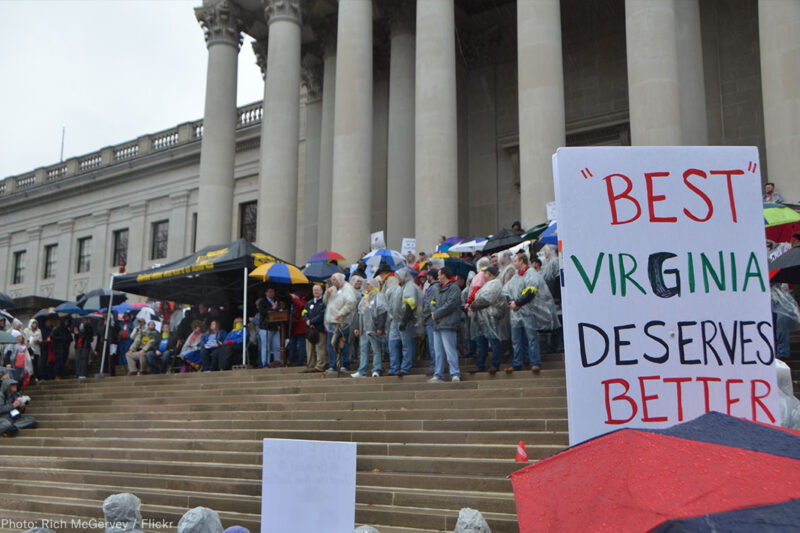
An obscure West Virginia law that came to light during the teachers strike gives police expansive powers to crack down on peaceful protesters. While the strike ended on Tuesday with a victory for the teachers, lawmakers should still address the deficiencies of the state’s “crimes against the peace” law — its literal riot act.
The law, as interpreted by a 1946 court case, allows law enforcement officers to employ a range of troubling and archaic responses to groups engaging in “unlawful” behavior. Among other things, it allows them to force private individuals to help shut down the group, search homes nearby without a warrant, and impose guilt-by-association on anyone present if an officer is wounded. These terms are not far from the original “Riot Act” passed by the British Parliament more than 300 years ago — which makes sense, since the West Virginia law largely reflects language drafted in 1849.
This law, as it stands, could have been used against the striking teachers — and it can still be used against all manner of protesters if it is not updated.
A bill ostensibly meant to bring the law into the 21st century was introduced before the strike began, but the revisions fall short. The bill would eliminate one of the law’s most disturbing provisions, which provides that if an officer dies or is wounded at an unlawful assembly, everyone present is guilty. But the bill would still allow police officers to commandeer private citizens to help disperse a crowd. And the existence of an “unlawful assemblage, rout, or riot” would still authorize police to search homes without a warrant and impose a curfew.
This means the law could be used to impose harsh measures against a group of entirely peaceful protesters and those around them — individuals who, say, step off a sidewalk and onto a street because of the number of people nearby, or who can’t hear a dispersal order or get out of a crowd quickly enough once it is deemed unlawful.
In many ways, these dangers mirror the troubling nature of the broader anti-protest legislative trend around the country. Rather than address the substantive issues raised by the powerful protests of the last two years — like racial justice, environmental protection, and the rights of indigenous communities — legislators have instead chosen to introduce bills that would pressure protesters to quiet their dissent.
In many states, these legislative efforts ignore existing law. In Iowa, for example, a new bill, supported by industry groups reacting to anti-pipeline protests, is framed as necessary to “protect critical infrastructure” — including, unsurprisingly, pipelines. If passed, it would not only chill environmental protest, but it would replicate an existing law that already criminalizes property damage. In Wyoming, legislators are considering a similarly repetitive and harmful bill.
In West Virginia, lawmakers are now in danger of reaffirming an existing, antiquated law. It’s well past time for that legislature, and legislatures around the country, to bring laws that chill protesters into the 21st century.
